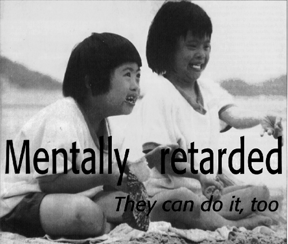

To the extreme dismay of many social workers, this incorrect view recently resulted in clashes in Kowloon over the establishment of a Down syndrome centre. Although the centre has now opened, suspicions linger among the general public.
Down syndrome is probably the most common cause of mental retardation in the industrialized nations. What's more, its frequency is likely to increase: The disorder occurs most frequently when women postpone their first birth until late in life, and women today are delaying parenthood in order to pursue educational and professional goals.
Down syndrome gets its name from English physician John Langon Down, who described the disorder in 1866. It is a genetic disorder that appears with a frequency of one per 700 to 1,000 live births, usually among women over the age of 40 who are having their first baby.
Down syndrome victims have one extra chromosome. Most of the human body's 46 chromosomes occur as 23 pairs, but people with Down syndrome have an extra chromosome, giving them a total of 47. The disorder is characterised by mild to severe mental retardation, weak muscle tone, a lowered forehead, and an extra fold in the eyelid, called an epicanthic fold.
Because of this fold in the eyelid, the disorder used to be called mongolism.

Hong Kong Down Syndrome Association
Last August, residents of Tung Tau Estate, near Wong Tai Sin, vigorously opposed the establishment of a rehabilitation centre there for the mentally retarded. They organized demonstrations and tried to block construction.
The Hong Kong Down Syndrome Association, which operated the centre, was later attacked in an anonymous raid after the centre opened. Association Director Alison Tam said labels about the mentally retarded are dangerous and unfounded.
"The mentally retarded are, by nature, kind, simple and eager to make friends. They are optimistic, easygoing and easily satisfied, though a bit stubborn perhaps," she said. "I can't deny that they have tempers sometimes, but in this regard they are just the same as us."
In fact, not many people know exactly what "mentally retarded" means. In clinical terms, "mentally retarded" refers to people who score exceptionally low on intelligence measures and who have a marked deficiency in adaptive skills.

The mentally handicapped can learn how to skate, among other things.
According to Dr. Sing Lee, a senior lecturer in the Department of Psychiatry at The Chinese University of Hong Kong, mentally retarded people can be divided into four groups based on their IQs, or intelligence quotients. Briefly, the IQ is the ratio of one's mental age to one's physical age, multiplied by 100.
While average people score around 100 on IQ tests, mildly retarded people score from 50 to 70. Further down the scale are the moderately retarded, whose IQ scores range from 35 to 50, and the severely mentally retarded, with scores of 20 to 35. The lowest group, the profoundly retarded, have IQ scores below 20. The last group represents only 0.05 percent of the population.
The capabilities and skills of these groups vary a great deal. In fact, people in the mild and moderate groups often get married, have careers and participate in society. On the other hand, people in the profound and severe groups require professional care. "However, people always get confused about them (the different groups). They think they (mentally retarded people) are not capable of doing anything, which may be the case only for the few profound patients," said Dr. Lee.
Even for the moderate, the severe and the profound mentally retarded, there is still potential for them to learn basic skills with training, said Mrs. Anna Po, a teacher at a pre-education training school for the mentally retarded."With the help of nurses, physical therapists and language therapists, they (moderate and severe mentally retarded people) can acquire some motor skills, improve coordination of the limbs and learn how to climb and stand.

The mentally handicapped can work like normal people after special training
"What's more, we can teach them basic concepts and some social skills -- how to get acquainted with other people through games."It is important to help explore their potential, for it can relieve their dependence and hence the strains on their families and society as a whole," said Mrs. Po.
This view is shared by the Hong Kong Down Syndrome Association's director, Miss Tam, who said mentally retarded people are in a difficult position to explore their own potentials."They face many more pressures than ordinary people since they are poor at expressing themselves and are looked down by other people.Their capabilities are therefore more difficult to explore when compared with other people," she said.
Meanwhile, the physical condition of the mentally retarded exacerbates their problems. It is common for them to have other disorders as well, said Miss Tam. For instance, about half of them have heart problems, and many have difficulties in seeing and moving around.
What the mentally retarded need, said Miss Tam, are the same things that ordinary people need: education, jobs, emotional support, and care.
At present, there are sheltered workshops and mobile crews to aid mild mentally retarded in the Territory."Three mentally retarded patients enrolled in our training courses have been working for several months already. One works as an office assistant, and the others clean up offices in Central.
"However, the public is still not ready to employ them in spite of their proven capability. They still have misconceptions about them and mix them up with patients suffering from other illness like autism and mental disorders," said Miss Tam.
According to Dr. Lee, the source of such confusion is that the behavior of the mentally retarded and the mentally disordered are, using the public's standards, abnormal."People get confused with them (the mentally retarded and disordered) because their behaviors are both considered to be deviant.If you say hello to them, they may not respond to you by smiling. They may just respond with a passive face and no other reaction.Therefore, the public mixes them up and cannot distinguish among them."
While many people have the impression that the mentally retarded tend to be more violent, and thus pose threats to others, Dr. Lee said not even the mentally disordered, let alone the mentally retarded, are commonly associated with aggressive behavior."Though there are some mentally disordered people with aggressive inclinations, the frequency of violent behaviour is no higher than that of ordinary people."
"Take the cases reported in the newspaper: While violent attacks are almost always committed by ordinary people, there may be only one case of a mentally disordered patient attacking other people in 10 years' time.They usually kill themselves or attack themselves rather than attack other people," said Dr. Lee.
The public's confusion about the mentally retarded and mentally disordered is often blamed on mass media.
For instance, the Hong Kong Down Syndrome Association recently protested a Television Broadcasting (TVB) series Dragon-Mouse Brothers that the association claimed provided misleading information about Down syndrome victims. The show allegedly suggested that patients suffering from it would lose their memory after the age of 15.
"The media may suggest mis-conceptions and stereotypes about them.It is difficult to correct people's wrong perceptions. Hence, the media must be more conscientious in dealing with such sensitive matters," maintained Dr. Lee."
In the Tung Tau case, estate residents now have a better perception of the mentally retarded. According to Miss Tam, the relationship between the neighbourhood and the centre has been improving as a result of personal contacts between clients and estate residents.
In one recent campaign, some mentally retarded people helped some single elderly folks to clean up their home around New Year's."Misconceptions can be corrected through direct contacts," concluded Miss. Tam.